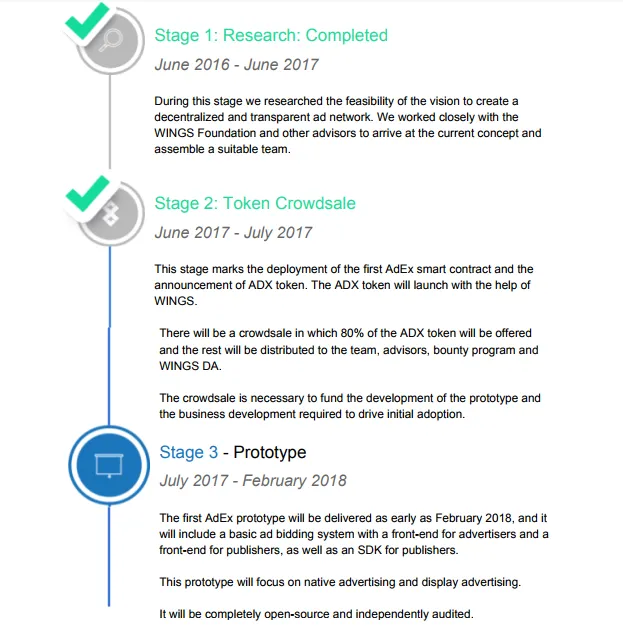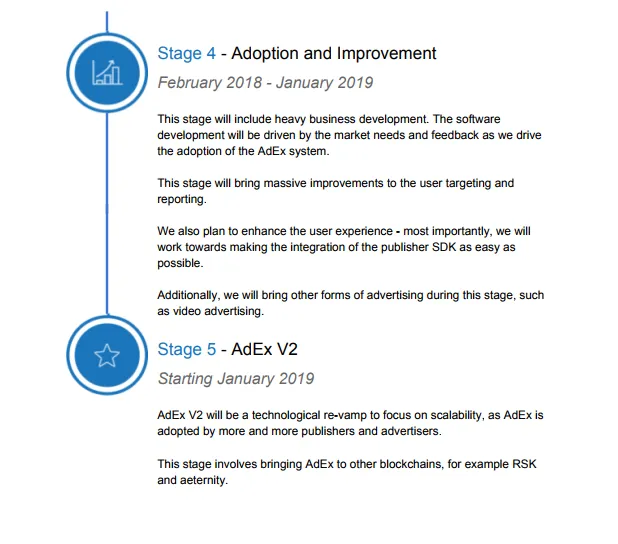What is AdEx?
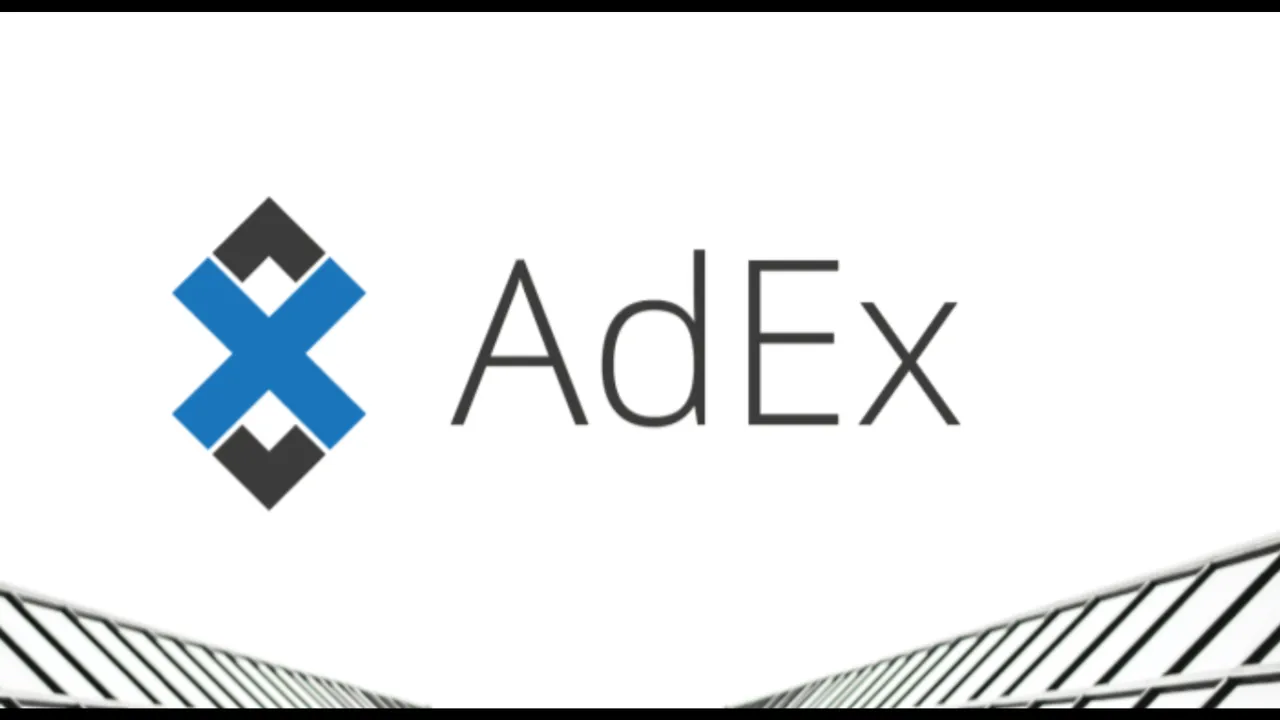
AdEx is an ad serving network aiming at disrupting the existing online advertising landscape and address its significant problems: advertising fraud, privacy and consent to receiving sponsored messages, etc.
We believe we can empower advertisers and publishers with a platform that is secure, transparent and beneficial for all the parties involved in the process, consumers included.
Website : here 
WHITEPAPER : here 
How It works?
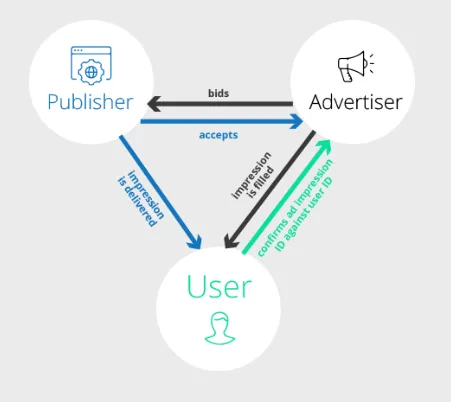
AdEx is a decentralized ad exchange built on Ethereum blockchain and smart contracts. The
AdEx platform is designed to disrupt and replace the traditional digital advertising models by
providing a transparent, focused solution for advertisers to collaborate with ad publishers
and reach the best potential clients.
The core feature of AdEx will be the so-called AdEx User Profile - a personalized page that
allows every end user to understand and control the ads delivered to them. Giving more
control to the user is highly beneficial for advertisers since users voluntarily provide more
information about their preferences and consumer behavior, about their shopping habits and
purchase preferences. This means that with the help of the user’s AdEx Profile advertisers
achieve surgical precision for ad targeting and ensure a high Return On Ad Spending
(ROAS).
The AdEx profile will be automatically generated for each user. Users will still be shown ads
even if they do not tweak their profile and preferences.
The technology of AdEx leverages blockchain and smart contracts, thus eliminating the
complexity and confusion of existing ad serving networks. The network is regulated by the
users and the users only, taking care of the most common issue advertisers today are
facing: lack of transparency and incorrect/unclear reporting of advertising campaign results.

Partners
The AdEx team is working with WINGS - a decentralized platform for crowdfunding projects
that was recently named one of the top fintech startups by the CoinTelegraph. WINGS have
a core role both in advising the AdEx project itself, and in providing the platform for the AdEx
crowdsale.
AdEx The team is also backed up by BITMAIN Technologies, a world leader in Bitcoin and
cryptocurrency mining technology. In 2015, Bitmain made a significant investment in the
Stremio platform.

BITMAIN Technologies is one of the most recognizable and most valuable bitcoin company. The company supplies high-quality, efficient computing chips, and it's main focus is the production of bitcoin miners based on the Bitmain's ASIC chip.

WINGS is a software platform designed to promote new open, decentralized technology architecture. By using the WINGS DAO organizations are empowered by efficient decision making and decentralized governance.
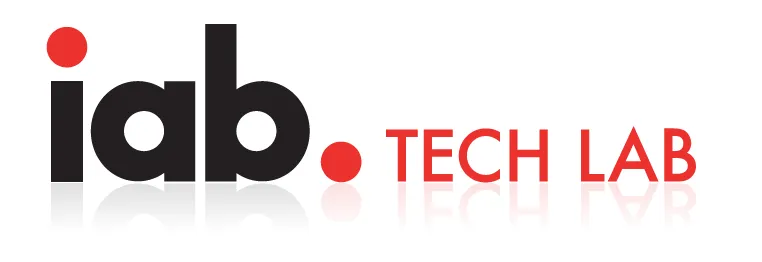
The IAB Technology Laboratory (IAB Tech Lab) is a nonprofit research and development consortium charged with producing and helping companies implement global industry technical standards and solutions for the digital media and advertising industries.

Stremio is a semi-open source video entertainment platform designed to source and deliver any type of video content within the same software app. Since it's launch in 2015, Stremio was downloaded by more than 4 million people.

Fintech Blockchain Group, or FBG, is one of the largest crypto hedge funds and venture capital funds in China. The company has invested in projects like WINGS, Bancor, Coindash, Aeternity and others.
Team
AdEx is being developed by a team that has worked together on Stremio, a video
entertainment hub that grew from 0 to 4+ million installs in just under 2 years.
Lead by Ivo Georgiev and Dimo Stoyanov, the team brings extensive experience in the
areas of software development, cryptography and blockchain, video streaming, as well as in
marketing and online advertising to the table. These combined knowledge, experience and
the professional backgrounds of the founders are essential ingredients for the success of
AdEx

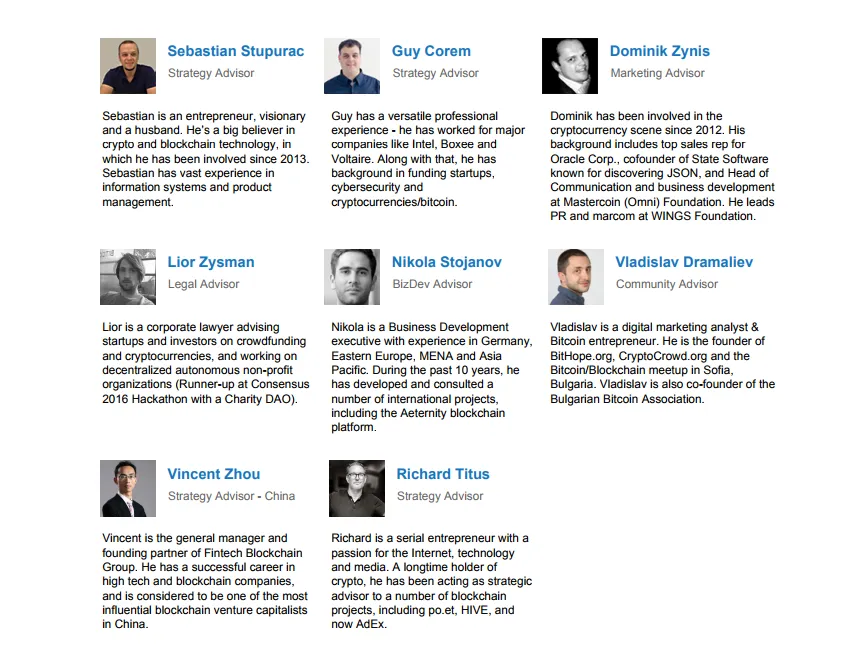
Problem #1: Lack of consumer consent
While popular advertising networks like the ones of Google and Facebook allow for some
extent of consent and control over what ads users see, this functionality is very limited, and a
lot of options are simply hidden from the end user (Facebook, for example, collects data
from the so-called “data brokers” but it took us purposeful research to find information on
opting out of these) . Furthermore, it is directly bound with the targeting parameters of each
campaign, launched by an advertiser - if an advertiser makes a mistake when defining these,
the ad will be broadcast to people who may not be interested in it and may not want to see it.
Solution: The AdEx Profile
As we mentioned earlier in this paper, each and every user, to whom AdEx serves ads, will
have their own profile where they can be as precise as they want outlining their interests and
preferences. This profile will ensure that consumers only see ads that are relevant to them.
For advertisers this means more precise targeting, less opportunities for mistakes when
setting their campaigns, and higher conversion rates.

Problem #2: Privacy concerns and data misuse
Major ad serving networks and exchanges operate with huge amounts of centralized data
that can easily be traced back to the consumers’ identities. Despite legal disclaimers,
consumer have no knowledge of the purposes, for which their data is used, which is a threat
to their online privacy - a threat the end users can do nothing about. Most advertising
networks include disclaimers about disclosing data to third parties, however despite these
disclaimers, consumer and marketing data is being sold by data brokers (unfortunately, there
is no reliable information available on the data broking market size but we have reasons to
believe it’s a multi-billion dollar industry).
Solution: Blockchain ensures anonymous use of big data
The blockchain technology, which AdEx utilizes, allows to anonymize large chunks of data
so it is only used for statistical purposes. Put simply, with the help of blockchain, advertisers
still get to receive and process data about their target audiences and consumers in the form
of statistics only - without compromising the privacy of these consumers.

Problem #3: Lack of bidding transparency
Existing real-time bidding (RTB) platforms offer no information about ad bids whatsoever.
This means that an advertiser is told the maximum bid for a particular ad property is $X but
is not given the opportunity to verify this.
Solution: A decentralized exchange that can be audited
Due to the fact that AdEx is based on blockchain, advertisers can easily trace every
click/view and verify every component of a campaign (participants, ad placements,
impressions and clicks, etc.). The information is decentralized so it can’t be hogged or
manipulated by the ad exchange so advertisers are only paying for actual results.

Problem #4: Ad fraud
The current online advertising ecosystem is flawed. It enables fraud committed by
advertising networks, by advertisers and by malicious third parties. According to reports from
ad agency The&Partnership and the Adloox audit verification company, in 2017 brands will
suffer losses in the amount of $16.4 billion due to ad fraud (bots, exploiting backdoors in ad
serving networks, etc.).
The question of advertising fraud should also be addressed by ad publishers. The global
media supply chain also needs to change to ensure ads viewability transparency, reliable
measurement, compliance rules and common standards for advertisers.
Solution: The AdEx anti-fraud mechanisms
AdEx will equip advertisers with technical mechanisms to trace and prevent fraud and invalid
ad traffic. This technology in combination with the transparency, real-time reporting and audit
accessibility of blockchain helps deliver a platform where advertisers know exactly how
much and why they are paying for advertising inventory.

Problem #5: Payment methods limitations
All existing ad networks require advertisers to use verified payment methods such as bank
accounts, credit cards, etc. However, for many advertisers (especially micro businesses in
developing countries), that’s an issue.
Solution: Cryptocurrency
Blockchain and the use of cryptocurrencies allows literally anyone to take advantage of
advertising possibilities to grow their business.
Summary
As you can see, there are way too many things wrong with the current state of the online
advertising industry. That means that the time has come for an impactful disruption of that
landscape, and this is where decentralized ad exchanges such as AdEx come in.
With these new solutions, advertisers will be able to regain control over their advertising
spend, they will be able to limit their exposure to potential ad fraud and will be empowered to
achieve higher return on their marketing spending.
Publishers will benefit from more interest from advertisers, more targeted ads and higher
level of end user satisfaction and ultimately - higher advertising revenues.
Last but not least, end users will finally have an online environment where they can receive
targeted, tailor-made ads without compromising their privacy and personal data.
Roadmap
